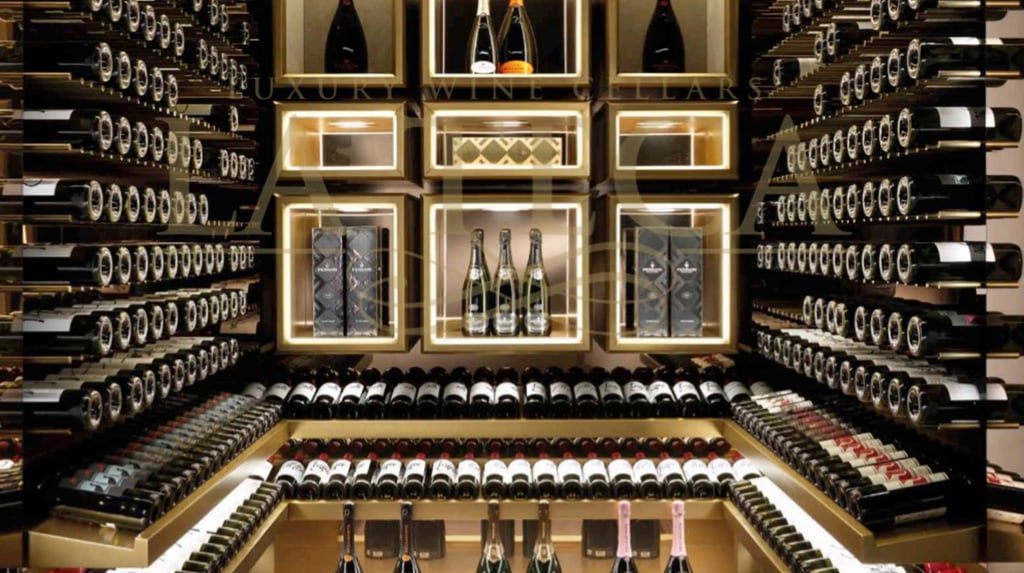
Fine Wine Storage 101
Protecting Your Investment
4/3/2025


Fine wine is more than just a luxury—it’s an investment that can appreciate significantly over time. However, one of the key factors in ensuring that your wines increase in value is proper storage. Whether you’re a seasoned collector or just starting to build your portfolio, understanding how to store your wine correctly is crucial to maintaining its quality, flavour, and market value.
In this week’s WineLux edition, we explore the essentials of fine wine storage, from ideal conditions to professional storage solutions. Learn how to protect your investment and ensure that your wines age gracefully, preserving both their value and enjoyment potential.
Why Proper Wine Storage is Critical for Investors
The value of fine wine depends not only on the producer, vintage, and rarity but also on the condition in which it is stored. Wines that are kept in poor storage conditions—exposed to fluctuating temperatures, humidity, or light—can spoil, losing both their quality and value. Conversely, wines stored in ideal conditions can improve over time, allowing them to reach their full potential and command higher prices on the secondary market.
Here’s why proper wine storage is crucial for investors:
Preserving Quality: Wine is a living product that evolves in the bottle. Proper storage allows the wine to age gracefully, developing complex aromas and flavours over time. If stored incorrectly, however, wine can oxidise, become tainted, or lose its desirable characteristics.
Maintaining Value: Wines that are poorly stored will lose their market value. Collectors and investors prioritise wines that have been kept in optimal conditions, ensuring that they maintain their quality and provenance.
Provenance: For investment-grade wines, provenance is key. Auction houses and buyers will often request detailed records of a wine’s storage history. Wines stored in professional facilities or well-documented home cellars are more likely to fetch higher prices at auction or resale.
The Ideal Wine Storage Conditions
To protect your wine investment, it’s essential to create or use a storage environment that mimics the conditions of a traditional wine cellar. Here are the key factors to consider:
1. Temperature
The most important factor in wine storage is temperature. Wines should be stored at a consistent temperature, ideally between 10°C and 15°C (50°F to 59°F). Temperature fluctuations can cause the wine to expand and contract, damaging the cork and allowing air to seep into the bottle, leading to oxidation.
Pro Tip: Avoid storing wine in areas that are prone to temperature swings, such as kitchens, garages, or near heating appliances. Temperature stability is key to preserving the wine’s integrity.
2. Humidity
Wine should be stored in an environment with a humidity level between 60% and 70%. If the air is too dry, the cork may shrink, allowing air to enter the bottle. Conversely, if humidity is too high, it can lead to mould growth or damage to the wine labels, which can reduce the bottle’s value.
Pro Tip: If you’re storing wine in a home cellar, consider using a humidifier or dehumidifier to maintain the ideal humidity level.
3. Light Exposure
UV light can degrade wine over time, causing it to age prematurely. Wines should be stored in a dark environment, away from direct sunlight or fluorescent lights. Many wine bottles are made with dark glass to offer some protection, but additional shielding is essential.
Pro Tip: If your wine storage area is exposed to light, consider covering your bottles or using UV-protected storage doors to safeguard your collection.
4. Vibration
Wines should be stored in a stable environment, free from vibrations. Constant movement can disrupt the aging process, disturbing the sediment in the bottle and potentially altering the wine’s flavour and texture. Avoid storing wine in areas near heavy machinery, household appliances, or high-traffic areas.
Pro Tip: If you live in an area prone to earthquakes or vibrations, consider using wine racks designed to absorb movement and protect your bottles.
5. Bottle Position
Wine bottles should be stored horizontally to keep the cork moist. If the cork dries out, it can shrink, allowing air to enter the bottle and spoil the wine. Horizontal storage ensures that the wine remains in contact with the cork, preventing it from drying.
Professional Wine Storage Solutions
For investors with valuable collections, professional wine storage facilities offer a convenient and reliable solution to ensure wines are stored in optimal conditions. These facilities are equipped with temperature and humidity controls, security measures, and insurance, providing peace of mind for collectors who may not have the space or means to create a proper storage environment at home.
Benefits of Using a Professional Wine Storage Facility:
Temperature and Humidity Control: Professional facilities maintain the ideal conditions for wine storage, ensuring that your collection is protected from environmental fluctuations.
Security: Reputable storage facilities offer secure access, surveillance, and insurance, protecting your valuable investment from theft or damage.
Provenance Documentation: Many professional storage facilities offer detailed records of your wine’s storage history, which can be invaluable when selling or auctioning your collection.
Convenient Access: While professional storage facilities offer high-level protection, they also provide convenient access to your collection when you need it. Whether for special occasions or resale, you can easily retrieve your bottles.
Top Professional Wine Storage Providers:
Octavian Vaults (UK): One of the most respected names in wine storage, Octavian Vaults offers secure, climate-controlled facilities in former military bunkers, providing ideal conditions for wine aging.
Domaine Wine Storage (USA): With locations across the United States, Domaine offers state-of-the-art storage facilities with a focus on providing customised services for wine collectors and investors.
Caveau de Bacchus (France): Located in Burgundy, Caveau de Bacchus provides secure, temperature-controlled storage with a strong emphasis on provenance and aging potential.
Home Cellar vs Professional Storage: Which is Right for You?
Deciding between a home wine cellar and professional storage depends on the size of your collection, the value of your wines, and your personal preferences. Here’s a comparison to help you make the right choice:
Home Cellar: Ideal for collectors who want direct access to their wines and enjoy the personal touch of managing their collection. However, setting up a proper home cellar requires investment in climate control systems and space.
Professional Storage: Best for investors with high-value collections who prioritise security, insurance, and provenance documentation. Professional storage is a hassle-free option, offering peace of mind and optimal conditions, but with limited immediate access.
How to Maintain Provenance and Value
As an investor, maintaining the provenance of your wine is crucial to preserving its value. Here’s how to ensure that your wines retain their market appeal:
Keep Detailed Records: Maintain accurate records of when and where you purchased each bottle, as well as its storage history. Buyers and auction houses will often request this information to verify provenance.
Consider Professional Storage: Wines stored in professional facilities often have better resale value, as they come with documentation verifying that they’ve been kept in ideal conditions.
Monitor Your Collection: Regularly inspect your wine bottles for signs of leakage, damage, or deteriorating labels, as these can reduce the value of your collection.
Conclusion: Protecting Your Wine Investment for the Long Term
Proper storage is the foundation of successful wine investment. Whether you choose to build a home cellar or store your wines in a professional facility, ensuring that your collection is kept in optimal conditions will help preserve its quality, provenance, and market value. As your collection grows, maintaining proper storage practices will protect your investment and allow you to enjoy the full potential of your wines.

